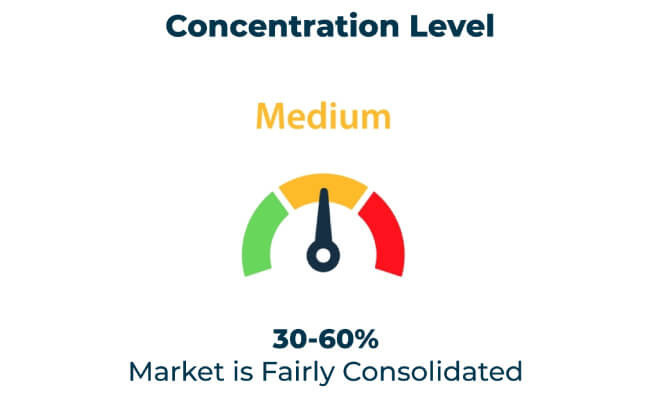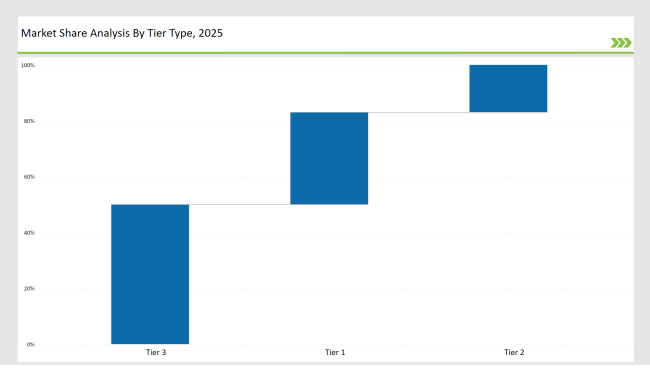The global adventure tourism market comprises multinational corporations, regional leaders, startups, and niche adventure brands. The market is currently dominated by major players such as TUI Group, Expedia Group, and Thomas Cook, who collectively control approximately 33% of the total market share.
These companies focus on delivering a broad range of adventure travel experiences, from trekking and safaris to water sports and eco-tourism, positioned across mass-market and premium segments. Regional players such as Intrepid Travel and G Adventures, which focus on specific markets like Australia, North America, and Europe, account for about 30% of the market by concentrating on unique adventure packages and sustainable travel experiences.
Niche startups and adventure brands like Machu Picchu Adventures and Nomadic Expeditions, known for their specialized tours and custom itineraries, contribute approximately 15%. Smaller tour operators that collaborate with larger online travel agencies (OTAs) represent a minor part of the market (~5%).
Explore FMI!
Book a free demo
| Global Market Share 2025 | Industry Share % |
|---|---|
| Top 3 (TUI Group, Expedia Group, Thomas Cook) | 33% |
| Next 3 of Top 5 (Intrepid Travel, G Adventures) | 17% |
| Emerging & Niche Brands (Machu Picchu Adventures, Nomadic Expeditions, Exodus Travels) | 15% |
| Smaller Operators | 5% |
| Regional & Specialized Tour Operators (Various Local Players) | 30% |

The adventure tourism market is heavily influenced by the type of activities on offer, and can be broadly categorized into two types: Soft and Hard adventure tourism. These two types constitute two different kinds of experiences, thereby attracting different travelers.
Soft adventure activities lead the adventure tourism market, taking up about 60% of the total market share. Such activities are popular among various segments of people, including families, older travelers, and those who seek less physically demanding adventures. The market has experienced sustained growth in activities like wildlife safaris, nature walks, and cultural tours as they attract a wider population and are deemed accessible for diverse fitness levels. There has also been growth in the number of people engaged in eco-tourism and sustainable travel, who seek experiences in natural environments that are more engaging and educative.
Adventure tourism attracts a broad appeal that varies widely based on who is interested. The demand for adventure tourism is also diversely segmented; it differs and has various characteristics depending on which travel group needs these services.
Family adventure tourism has been growing steadily, accounting for around 47% of the market. Families are looking to balance both enjoyment and safety; their interest in wildlife safaris, family-friendly trekking, and beach resorts has grown tremendously. Customized family packages that involve both adventure and relaxation have emerged among operators, and most of these operators have adopted different age-related customized tours. The family tourists are most interested in the eco-friendly resorts and nature-based experiences. The sector is thus expected to keep growing with family-oriented travel destinations.
Booking an adventure tourism experience by a traveler is crucial to the growth of the industry. Various booking modes either appeal to different consumer preferences or impact the overall market performance.
However, in the adventure tourism market, the role of travel agents is still an important one; they account for about 43% of all bookings. In this regard, traditional travel agents are very popular among families and older travelers since they offer such professionalism and convenience.
Travel agents package adventure tours together with other travel services, such as accommodation and transportation, which attracts people seeking an all-in-one deal. Although online booking platforms are increasingly important, traditional agencies continue to play a core role, especially in developing markets and regional destinations where consumers may prefer to book through familiar and trusted channels.
2024 was an impactful year for the adventure tourism market, with innovation, sustainability, and customer-centric products driving growth. Several leading players have shaped the industry by adapting to trends such as eco-tourism, wellness tourism, and adventure cruises.
TUI Group (Germany)
TUI Group has dominated the global adventure tourism market with its sustainable and responsible adventure tours. It has focused on the increasing demand for nature and wildlife conservation-based travel experiences by incorporating green initiatives and eco-conscious travel. Carbon-offset tours and partnerships with conservation projects, such as eco-safaris in South Africa, have also been successful in making the company a market leader. TUI also enhanced its adventure travel products by emphasizing family-focused adventure cruise itineraries that provide onboard activities as well as off-ship adventure excursions.
Expedia Group (USA)
Expedia continues to expand its footprint in adventure tourism by integrating the local tours and activities with the premium adventure travel packages through its Experience Platform. It has successfully positioned itself as a go-to online platform for booking adventure activities like hot-air ballooning, mountain climbing, and underwater exploration. Expedia has also strengthened its adventure offerings by partnering with local guides and adventure companies, giving clients access to curated adventure itineraries that include remote experiences and cultural immersion tours.
Intrepid Travel (Australia)
Intrepid Travel-the pioneer sustainable adventure-tour operator-remains committed to small group travel that carries the themes of local culture, ecotourism transportation, and food-based adventures. Its growth has been attributed to its commitment to providing adventure-travel packages centered on genuine experiences and reducing carbon footprints. Intrepid was indeed among the earliest providers of carbon-offset travel experiences and is constantly positioning itself as the global leader in responsible tourism.
G Adventures (Canada)
G Adventures has been on top with their authenticity on the adventure experience and their cultural immersion. Being one of the best small-group tour operators with adventure trekking and safari experiences, G Adventures has become a preferred choice for many seeking adventures in unique cultural experiences. With a strong thrust on personal connections with local communities and its commitment to sustainable traveling practices, G Adventures has undoubtedly become one of the most respected brands in eco-conscious adventure tourism.

| By Tier Type | Example of Key Players |
|---|---|
| Tier 1 | TUI Group, Expedia Group, Thomas Cook |
| Tier 2 | Intrepid Travel, G Adventures, Abercrombie & Kent |
| Tier 3 | Machu Picchu Adventures, Nomadic Expeditions, Exodus Travels |
| Brand | Key Focus |
|---|---|
| TUI Group | Expanding sustainable adventure tours and eco-conscious cruise experiences. |
| Expedia Group | Offering curated adventure packages with local operators, integrating local experiences through a platform. |
| Intrepid Travel | Growing responsible travel options by introducing carbon-neutral tours and eco-friendly itineraries. |
| G Adventures | Focusing on small-group immersive adventures that promote cultural and environmental awareness. |
| Thomas Cook | Enhancing its adventure tourism portfolio by including wellness-based packages and exclusive eco-tours. |
| Abercrombie & Kent | Launching ultra-luxury adventure travel experiences targeting affluent customers in remote and exotic destinations. |
| Exodus Travels | Expanding adventure trekking and safari offerings with a focus on responsible travel and local community support. |
The largest market share is held by multinational corporations such as TUI Group, Expedia, and Thomas Cook, collectively accounting for approximately 33% of the market.
Regional players such as Intrepid Travel and G Adventures hold around 30% of the market share by focusing on local tastes, sustainable tours, and niche experiences.
Startups and niche adventure brands, which often focus on customized itineraries and eco-conscious travel, hold about 15% of the market.
Emerging & Niche Brands control approximately 15% of the market.
The market concentration in 2025 is categorized as high for the top players, who control more than 30% of the market, medium for the top 10 players with 50% market share, and low for less dominant players who hold less than 20% of the market share.
Industrial Tourism Market Analysis by Experience Type, by End, by Tourist, by Booking Channel, and by Region - Forecast for 2025 to 2035
China Outbound MICE Tourism to US Market 2025 to 2035
Incentive Tourism Industry Analysis By Incentive Type, By Business Size, By End User, By Region – Forecast for 2025 to 2035
Cruise Tourism Industry Analysis By Cruise Type, By Experience Type, By End User (Solo Travelers, Families, Retirees, Business Travelers), By Region – Forecast for 2025 to 2035
Short-Term Vacation Rental Market Trends – Growth & Forecast 2025 to 2035
Air Traffic Industry Analysis in the Kingdom of Saudi Arabia 2025 to 2035

Thank you!
You will receive an email from our Business Development Manager. Please be sure to check your SPAM/JUNK folder too.